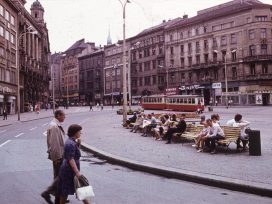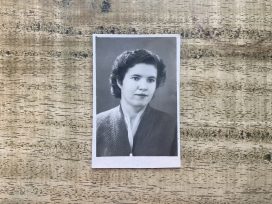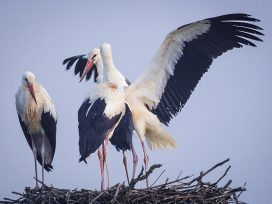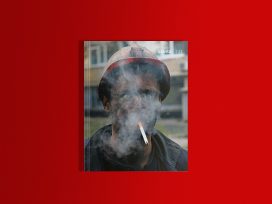I was reading Al-Zubaidi, Cassel and Roderick’s Writing Revolutions: The Voices from Tunis to Damascus, a book that mainly asks how to write about revolutions or, more directly, how to write revolutions. The answer they suggest is this: it is best to combine personal stories with theories, evaluations and historical accounts. The personal is political, in a “revolutionary” sense.
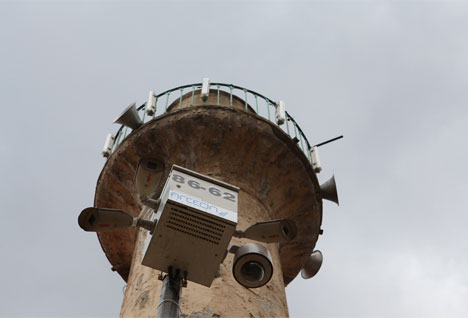
CCTV cameras in front of a minaret in Beyoglu. Photo: Paul Keller. Source:Flickr
The book includes articles on Tunisia, Egypt, Libya, Algeria, Yemen, Bahrain, Saudi Arabia and Syria. But you can also say the book is about a young girl’s headache, students drawing green penises on boards, unemployed and extremely bored people waiting for something to happen, writers lying down on the grass and tweeting about a revolution from their laptop.
Tons of personal stories.
An especially strong aspect of such an approach lies in its power to make you feel like you are “in” the events: you do not relate to them as a tourist but as if you too were a citizen of the cities involved. Or, alternatively, you know what they are talking about because we, the people of the world, are so connected today. Activism all over the world has so much in common, not necessarily in terms of specifics but in terms of spirit and, in many ways, in terms of tactics too.
So, I will here try to reflect upon censorship in Turkey, trying to follow what I personally feel about it and my related experiences.
*
In Writing Revolutions, Yasmine El Rashidi writes about Egypt and the revolution there. She poses the key question: when did it all start? She dwells upon several possible answers. One of them says it all began when Mubarek came to power! That’s a nice way to put it. Similarly, we can argue that today’s heavy censorship began when the AKP (Adalet ve Kalkinma Partisi or “Justice and development party”) and Recep Tayyip Erdogan first came to power in 2002.
It was an interesting election. Before 2002, Turkey had successive coalition governments. And then a terrible economic crisis hit the country in 2001. Many lives were devastated. People were seriously upset and angry, and were accusing coalition parties. The power that Turkey’s main political parties once yielded was enormously reduced. All of a sudden they were buried in history. The newly founded AKP, with its impeccable historical record, won easily. Even a businessman named Cem Uzan, who fabricated a political party out of the blue, managed to take seven per cent of vote that year.
A new era was beginning. There were no visible signs that the AKP would control everything in ten years time and build an authoritarian regime. Or at least I didn’t see any. Rather, suppressed Islamists seemed to have won the day in a way, and many thought they somehow deserved it.
Today, it is even difficult to remember how we felt in those years concerning censorship: everything is so weirdly coloured by top-down party surveillance.
But where do we see censorship today in Turkey? In which areas? First of all we see it in all media. On every TV channel and in every newspaper, censorship has reached unbelievable levels. Still, thanks to Twitter, hiding things is more complicated in today’s societies. But not all of Anatolia receives their news from social media. TV stations are still highly effective. Nearly all independent journalists have been sacked from their posts, many of them are still unemployed. Some of them are writing memoirs, each of which tells how censorship became a rule in Turkish mainstream media.
Government put pressure in several dirty ways on the media barons, since these –themselves dirty – rich guys had other businesses too and were vulnerable to the concerted efforts of the Turkish government to pose a threat to them. Most were forced to sell their mainstream newspapers and TV channels to businessmen close to the AKP. The conditions of these transactions will someday be a matter of for the courts.
As we read the journalists’ memoirs, we learn that broadcasting prime minister Erdogan’s very frequent speeches live on TV was already a bone of contention in mid-2000s. Now, when he talks somewhere, nearly 17 main channels broadcast it live from beginning to end. And these speeches tend to be very repetitive. Sometimes we saw five or six main newspapers publish exactly the same headline. Sometimes, something absolutely crucial happens and, without thinking, you check the news channels on TV. Then your wife says: “what are you doing? This is a scandal! You shouldn’t miss that!” She means, I shouldn’t miss what is going on by watching news channels on TV instead of getting news from Twitter and Facebook! (The scandal in this case was a recording of a telephone conversation between prime minister Recep Tayyip Erdogan and his son Bilal Erdogan about hidden illegal funds. A substantial amount of money was mentioned, and all in cash. We heard of the difficulties Bilal Erdogan faced in carrying such amounts from their own houses to safer places. Erdogan expressed his fear that prosecutors may search his own household too.) A TV news channel has become a site for hiding news, whereas a social media account has become a means of getting news. Of course, many Twitter/Facebook/Instagram/Ustream users became independent journalists themselves.
There are extreme examples of news channels hiding news in Turkey. During the Gezi Resistance last year, news channels were broadcasting documentaries about penguins instead of showing what was going on, while the whole country was on the streets protesting and the whole country shook. Previously, when Turkish jets bombed innocent Kurdish villagers in Roboski (Uludere) and killed many people including young boys, no TV channel said a word about it for more than ten hours. It was unbelievable and an awful memory in this country’s history already. Both the horrible incident – Turkish planes bombing their own country and killing young boys wrongly assumed to be PKK guerrillas – and the Turkish news channels and other TV channels playing hear no evil see no evil for more than ten hours. Today, no journalist is allowed to ask the prime minister questions. Press meetings are obvious frauds. The journalists are provided with questions beforehand. This pressure makes journalists a bit dumb sometimes. Once the Bulgarian prime minister was here and a Turkish journalist asked him about natural gas pipelines. The Bulgarian prime minister didn’t understand a thing and wanted the journalist to repeat the question. He did. Then Erdogan understood and laughed and explained. It turned out that Erdogan wanted to say something about natural gas at that meeting and questions had been given to journalists already but directed to the wrong person when asked.
Now we know that government embedded its own representatives inside newspapers and TV channels with one purpose: to control media directly and in meticulous detail. There are counsellors of the prime minister who call these embedded representatives and give them orders. But the prime minister himself calls them too.
Government even interferes with the plots of TV series. Entertainment is under control too, not only news. For example, there was a couple living together in a popular TV series and government pressure made the screenwriters marry that couple. The characters lived happily ever after, their wedding rings representing the censorship attempt. Government also forced a channel to sack a woman presenter because of her cleavage! There is a unit called the Prime Minister Press Centre that controls all TV programmes. Put a foot wrong and well-known TV personalities can go unemployed for years. An atmosphere of self-censorship prevails. During Gezi Resistance last year, according to the numbers provided by Turkish Journalists Association, 21 journalists have been sacked, 37 of them have been forced to resign and at least 14 forced to take annual leave.
We know about the censorship of posters, we see teams of cleaners painting over graffiti on walls in the morning, censorship in theatres grows stronger everyday: one such story follows another.
On top of all of which, we have entered an era of heavy Internet censorship that puts Turkey on a par with Iran, China and North Korea. We are already used to changing our DNS to access many websites. But now people feel the need to become more expert in finding alternative ways to access the Internet freely, via virtual private networks (VPNs) for example.
Checking Twitter and Facebook is the main path to the news today. That’s why prime minister Erdogan hates Twitter and refers to it as “this menace called Twitter”. Now we understand more why people use terms like “Twitter revolution”. Before, it didn’t make much sense. Some of my friends didn’t even have a Twitter account; Facebook was obviously not regarded as a respectable way of spending time on the Internet.
Add to this picture the fact that an extraordinary number of telephone lines are wired. Self-censorship on the phone is part of everyday life. A foreign affairs minister may personally call a TV station to pressure it into sacking a correspondent in a foreign country. And all such attempts are successful – otherwise they declare fiscal war on media owners. Unpaid taxes become a weapon against bosses. If you don’t answer the phone to the foreign affairs minister then the ministry of finance calls.
Actually, I am still not used to the reality of new Internet censorship. I haven’t yet learned about alternative ways to hide our IP addresses. But it looks like I will have to.
Censorship has many faces. It is nothing new. It was not invented by the AKP. Especially when we are talking about Turkey. But everyone agrees that it is the scale of the operation, of the trap we are in now, that is unprecedented. Many people have announced that the situation is much worse than in the 1980s, although everyone knows how bad the situation was after the violent military coup d’etat of 12 September 1980.
The opposition has its own censorship channels too. I have been writing for a socialist newspaper and as an anarchist it was always like playing an away game. Yet it was ok, they didn’t interfere with anything I wrote for a long time. But when the Syrian revolts began, most of the Turkish socialists took the side of Bashar al-Assad – mainly because Erdogan was against Assad and the Turkish government was violently interfering in the Syrian conflict. For the socialists, being on the side of Assad meant to be against Al-Qaeda, against Erdogan, against world jihadists. So they didn’t like it when I declared that we need a third position where we are against both parties and where we welcome all emancipatory attempts of the people of Syria. That was the last piece I was able to write there. But today, if I had to compare such incidents with the scale of censorship rolling over the country, I would say maybe we need a different word, other than censorship. A stronger word.
Words are under siege in Turkey. Journalism is in a hostage situation. And when this era ends, I don’t know how long will it take for society to recover.
